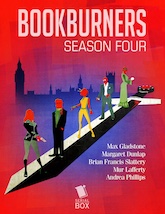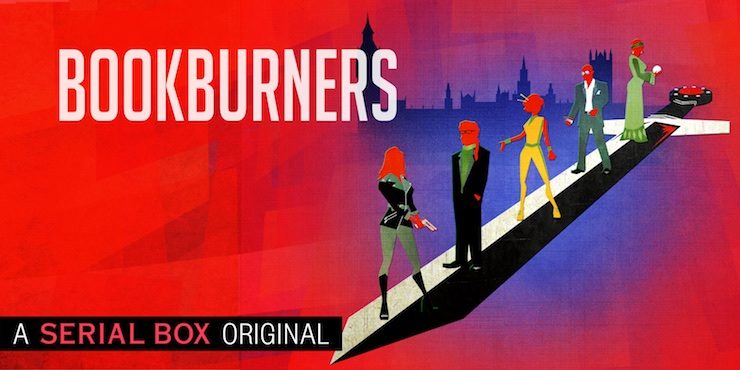Magic is real, and hungry—trapped in ancient texts and artifacts, only a few who discover it survive to fight back. Detective Sal Brooks is a survivor. Freshly awake to just what dangers are lurking, she joins a Vatican-backed black-ops anti-magic squad: Team Three of the Societas Librorum Occultorum. Together they stand between humanity and magical apocalypse. Some call them the Bookburners. They don’t like the label.
Everything in the Bookburners’ lives falls into two categories: Before London and After London. Before London, things were strange, sure, but After London… “strange” doesn’t even begin to describe it. Magic is everywhere—and the Bookburners can only be in one place at a time.
Having cut ties with the Vatican, the members of the former Team Three are a little at a loss. Their old roles don’t feel right anymore; their old job seems almost quaint, considering how much magic flourishes in plain sight. But with the return of an old enemy, they find a renewed purpose. And this time, they know that the only thing they can depend on in this world is each other.
Season 4 of Bookburners—a serial created by Max Gladstone and co-written with Margaret Dunlap, Mur Lafferty, Andrea Phillips, and Brian Francis Slattery—launches June 13th from Serial Box.
Sal Brooks lay awake in darkness, waiting for the screams.
Nightmares had roused her halfway through most nights since London. Back in New York, on the force, there had been bad nights too, when she lay in the cold bed and wished the world would—not end, just stop, so she and the monsters in her mind could catch their breaths and share a cigarette.
London did not stop. It never would.
 A rift had opened from the Thames out into the pink beyond the world, the land of demons, of magic. They’d closed it, Sal and Grace and Liam and Asanti and Menchú and Frances, all of them together. They’d killed a dragon in the melting streets of London. But they had fixed nothing. London remained transformed. Flesh coated walls, and the Ferris wheel they called the Eye blinked now. People died. People became butterflies. The Tower’s ravens merged into one jet-sized creature and menaced Heathrow. Magic bled from the wound that was London, and now Sal could not trust the pink in sunset or the dawn.
A rift had opened from the Thames out into the pink beyond the world, the land of demons, of magic. They’d closed it, Sal and Grace and Liam and Asanti and Menchú and Frances, all of them together. They’d killed a dragon in the melting streets of London. But they had fixed nothing. London remained transformed. Flesh coated walls, and the Ferris wheel they called the Eye blinked now. People died. People became butterflies. The Tower’s ravens merged into one jet-sized creature and menaced Heathrow. Magic bled from the wound that was London, and now Sal could not trust the pink in sunset or the dawn.
The Vatican and the Society refused to go public, to explain. And because the Vatican would not help the world, Team Three had left the Vatican.
They’d been on the road for the three months since, traveling from town to town to fight outbreaks and put out fires as governments flailed to respond—saving villages from monsters, saving monsters from villages. Sansone fed them leads, or Liam tracked cases down online, or Menchú heard something from his contacts in the priesthood, or Sal found clues in the paper. They’d shattered the icemen of Minsk, saved Bonn from clockwork vines, and stopped a guy in Belgium who dressed up like a werewolf, while around the world ancient powers woke and kids began performing miracles. They were bailing out a boat with a broken hull, but none of them had any better ideas.
So Sal lay awake, alone and cold under three banks of covers in a Polish boardinghouse, and tried to build her courage to sleep. The scratchy wool blankets would be here in the morning, and the brown striped wallpaper, the whole close cold room and the deep slopes of green valley wall outside. They would not melt. Nothing would change into anything else, except in the usual slow way that the whole world turned to dust and mud.
She made herself watch the sky out the small window, cloud-choked and chill. The black offered no comfort, and that was a comfort all its own.
She was not ready for the scream.
It wasn’t hers, was the thing.
Something moved out there in the night—big and heavy and rushing toward her. It crashed into the windowpane. Claws scraped, a hooked beak rapped, big dark eyes stared through the glass. The scream came again, a croak, a cracked cry.
She forced herself from bed, her breath pale mist, checked the silver cross around her neck—not tarnished yet—and grabbed the knife from under her pillow. The window screeched as she thrust it open, and the raven tumbled through and fell to the carpet.
Pink threads wrapped its wings and tightened across its chest, drawing black oil instead of blood. Its wings drummed against the floor, and she jumped when they brushed her bare ankle. The bird’s eye blinked and rolled in pain. In one talon the raven held a rumpled, pierced letter, with Team Three written in a spiderweb hand.
This is bullshit, insisted the part of her that still thought of herself on some level as Sal Brooks of the NYPD. This was way beyond procedure. Ravens fucking with your window at night, much less ravens being attacked by glowing pink threads, had nothing to do with police work. This was not on the detective’s exam. She needed a specialist.
That part of her lived in a world where her brother had never come to her apartment bearing a stolen magic book, a world where she’d never joined the Society, a world where London had never happened.
But time passed. People grew like trees around their scars. Sal Brooks was a specialist now.
So she knelt beside the raven and set a hand to the surging muscles that drove its wings, and when she whispered, “Hold still,” she was not shocked to see it try.
It still fought her when she slipped her silver knife into the wound across its chest. She pressed against the raw flesh. The oozing black oil that was not blood smoked when it touched her blade. She slid the knife tip beneath that pink wire and sawed up and down. The raven’s beak snapped. Its talon caught her wrist.
When the thread gave, it whipped loose like a snapped violin string, and she pulled her head back just in time. The broken end cut a stripe into her cheek instead of her eye, and the blood from that felt hot and thick and almost like tears.
The thread coiled, hissing, on the carpet. It blackened and shriveled and tightened and crumbled to ash.
The raven let her go, and she let the raven go too. In a graceless flurry of feathers and oil it found its feet, dripping still, and spread its wings, and bobbed its head in what Sal hated knowing was a bow. It released the letter, and nudged it forward with its beak. She held the raven’s gaze as she picked up the envelope. Ravens weren’t owls—you could not stare eye to eye with one of them. They watched you crossways.
She held out her bleeding arm, and it hopped on, talons not tight enough to pierce this time. Beyond the window the black sky spread. She bore the raven there and offered it the night, and it accepted.
She read the letter by the dim light in the cold. It might have been written in ink. She suspected it was not.
When she turned, the room was full. Arturo Menchú stood in the center, face grave. Liam, beside him, held a crowbar that a contact of Menchú’s in Switzerland had flashed with silver. He looked angry and confused, as ever. And beside them both, Grace. She bore no weapon. She did not need one. But Sal could not look at Grace right now. She made Sal feel too human.
The paper fluttered in a night wind that cut her as deep and sure as the thread. She didn’t feel the cold or the pain, not really. She was learning tricks to not feel. She hadn’t thought about Perry in almost a month. That was a lie.
“It’s from the Maitresse,” she said. “She has a plan. She’s holding a council of war. She wants us to come.”
A pink glow worked through the northern clouds. It might have been the northern lights, though they were too far south for that, or it might have been a reflection of the dawn. It was neither.
Excerpted from Bookburners Season 4, copyright © 2018 by Max Gladstone, Margaret Dunlap, Mur Lafferty, Andrea Phillips, and Brian Francis Slattery










